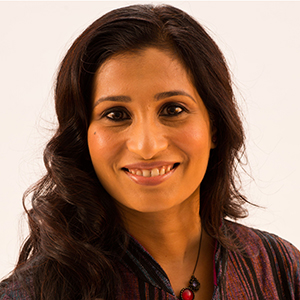Bhramar Mukherjee
Affiliation
Professor of Biostatistics, Epidemiology, and Global Public Health, University of Michigan School of Public Health
Research Professor, Michigan Institute of Data Science
Associate Director for Cancer Control and Population Sciences, University of Michigan
Educational Background
Purdue University: PhD, Statistics (2001)
Purdue University: MS, Mathematical Statistics and Probability (1999)
Indian Statistical Institute, Kolkata: MStat, with specialization in Applied Statistics and Data Analysis (1996)
Presidency College (Now Presidency University), Kolkata: BSc, Statistics (1994)
Awards and Recognition
Fellow, American Association for Advancement of Science (2017)
Gertrude Cox Award (2016)
Elected to Michigan Society of Fellows (2016)
John D. Kalbfleisch Collegiate Professorship, University of Michigan (2015)
University of Michigan Mid-Career Faculty Recognition Award (2015)
Outstanding Young Researcher Award (applications category), International Indian Statistical Association (2014)
Fellow, American Statistical Association (2012)
Elected member of the International Statistical Institute (2012)
University of Michigan School of Public Health Excellence in Teaching Award (2012)
John G. Searle Assistant Professor of Biostatistics (2008–2009)
I.W. Burr Award for Outstanding Doctoral Work, Purdue University (2001)
About Bhramar
I was born in Kolkata, India, in a family of intellectuals who are passionate about the liberal and performing arts and artists. Gauss, Newton, and Archimedes remained in the periphery while my father mandated we read the great Indian and Western classics in literature, visit art galleries, watch the best of world theater and cinema, become immersed in Tagore and Harry Belafonte music, and deconstruct the theories of Derrida and Foucault. In this eclectic family environment, I was frequently surrounded by long and heated debates about what constitutes and qualifies as powerful art, or what a story or a play is actually trying to convey, with no consensus among the discussants. Though I enjoyed every moment of my childhood drowned in confusion and creativity, I increasingly felt the need to find an objective truth to a problem at hand, so that there is no argument after.
I always wanted to get 10/10 in an exam as a student. I did not enjoy writing an essay and being at the mercy of my teacher agreeing or not with my style or what her subjective opinion was. As you can probably guess from this prelude, I was born as a highly competitive math nerd, the black sheep of the Mukherjee family. I was obsessed with mathematics and science—not obviously present in my genes. Often, I would hide my textbooks inside comic books so my parents thought I was relaxing and not studying! At every point in my life, I wanted to be as educated as I could possibly be.
Looking at my life, I am most proud of being a full-time single parent—with no family support—while I rose through the academic ranks. This took extraordinarily hard work, discipline, determination, and grit, but was truly worth it. I took my PhD qualifiers at Purdue in August of 1998, exactly 10 days after my daughter was born. The journey through the last two decades as a mother and a busy academic has been the most challenging and spectacular part of my existence.
In 2016, I was appointed as the associate director for cancer control and population sciences at the University of Michigan comprehensive cancer center. This is an unusual role for a biostatistician to undertake. Over the past two years, I have led this division with 70 core members and tried to generate new synergy and energy around cancer epidemiology, prevention, and outcomes research. My training as a statistician was key to my success in this position. I could see the potential and promise of data in defining a modern vision of population sciences research. For the first time in my life—instead of showing that a certain underprivileged group has 1.4 odds ratio for not getting cancer screening when compared to the rest of the population and developing methods for making the confidence interval around 1.4 tighter and tighter—I could actually do something about getting this number closer to unity by investing in screening programs that serve the community and may actually reduce disparity.
I have been fortunate in my career to reinvent myself several times and to be able to do different things as a professor and researcher. There is never a dull moment in the life of a biostatistician! I always pause to cherish the moments that constitute the bigger shared intellectual landscape of this academic journey. I hope more women will choose careers in quantitative sciences and make their own mark along paths less traveled. I plan to continue my own journey, making my own mark, and simply continuing to learn new things every day.











 (9 votes, average: 4.78 out of 5)
(9 votes, average: 4.78 out of 5)






